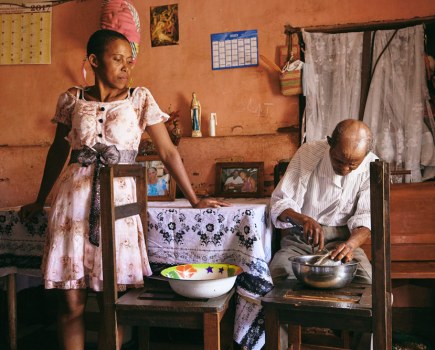Since last year, the House of Lords has debated the Enterprise and Regulatory Reform Bill 2012-2013, amid protests from photographic groups over its controversial treatment of ‘orphan’ works, where a copyright owner cannot be identified or traced.
NEWS UPDATE: Further controversy as Bill wins Royal Assent
Campaigners have voiced concern that most of these orphan photos in the UK will have been created and owned by foreign parties, but that any identifying metadata is often routinely removed before images are published.
If enacted, they argue that the controversial law would permit such works to be used without their permission and compensation for the rights holder.
Renowned photographer David Bailey has now entered the debate over the proposed law, which has received its third reading in the House of Lords and is on the verge of being granted Royal Assent.
In a letter to the Chancellor of the Exchequer, George Osborne, David Bailey says he is ‘appalled’ by the government’s stance and calls for the subject to be ‘dealt with properly’, in a separate Copyright Bill.
He adds: ‘I am told everyone will be able to get their hands on our so-called “orphans”, so libraries and museums can publish old photographs whose authors have long been forgotten.
‘But never mind what’s lying around on dusty old shelves, what about the millions of “orphans” that are being created every day.’
Bailey blames social media as largely responsible for routinely stripping names and contact details from digital files, and fears commercial bodies will make money from these images, rather than the photographers who created them.
The British Press Photographers’ Association, which published Bailey’s letter yesterday, argues that the new law ‘will not only harm our industry but also place this country at odds with a vital international treaty’.
To read David Bailey’s letter, in full, click HERE.
The Bill has now reached the ‘Ping Pong’ stage in Parliament, where both the House of Commons and House of Lords must agree on the exact wording of the Bill following amendments.
Once approved, a Bill receives Royal Assent and becomes an Act of Parliament.
Last month, Viscount Younger of Leckie (Conservative) said the Government ‘agree [s] that there will need to be a full and proper evaluation of the effectiveness of the orphan works scheme, and its impact on users and rights holders’.
He said that a ‘post-implementation review’ would be undertaken by the orphan works authorising body and would include, for example, ‘data on the number of orphan works registrations and permissions issued by the authorising body’.
The Bill received its first reading in the House of Commons nearly a year ago.







